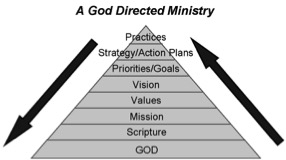 by Jay Jarboe
by Jay Jarboe
The church is God’s instrument in accomplishing his global mission. However, many churches today are struggling to join God in that effort. My work with Mission Resource Network (MRN) is to equip churches to be on mission with God, both locally and globally. In my conversations with churches, I often hear frustration regarding the lack of growth and discipleship on the mission fields they support.
 Too often, their response is to end the partnership with their current missionary and to look for a more effective work. What they fail to realize is that we send out missionaries and then expect them to succeed in the very area that we are failing in at home: making disciples. Many churches are now beginning to realize that we have become distracted from our primary purpose of “being and making disciples of Jesus Christ” (Matthew 28:16-20).
Too often, their response is to end the partnership with their current missionary and to look for a more effective work. What they fail to realize is that we send out missionaries and then expect them to succeed in the very area that we are failing in at home: making disciples. Many churches are now beginning to realize that we have become distracted from our primary purpose of “being and making disciples of Jesus Christ” (Matthew 28:16-20).
Churches are facing the reality that their mission work is not limited to a profession or a location. Nor is it something that they are merely involved in “over there” by supporting full-time missionaries. We all are called to live out the mission of God in our own lives and in our neighborhoods. I am encouraged to hear church leaders wrestle with this reality. Yet, these same church leaders struggle with how to start the process of re-discovering their mission.
How can churches regain their vision for local and global missions? There is not one simple answer to that question, but somehow we instinctively know that we must begin to think more like missionaries. We are living in the world’s third-largest mission field here in the United States with multiple nationalities represented in our communities. Culture, language, and worldviews have changed drastically around us. We are called to be “salt and light” in our own backyard!
At MRN, we have responded to these challenges by recalibrating our mission-team training to fit local church needs.
Most mission education involves developing five capacities within missionaries:
A Theology of Missions–our mission is rooted in the nature of God. A proper theology establishes a solid biblical foundation based on knowing God and his mission.
A Strategy for Spiritual Formation–missions is not primarily a strategic undertaking. It is a spiritual endeavor and missionaries must continually be conformed to the likeness of God’s son. Our mission is to glorify God, save the lost, and be transformed as disciples.
Cultural Awareness–missionaries must understand and adapt to various worldviews as they share the never-changing good news of Jesus.
Skills in Team Building–good “one another” relationships are essential in living “on mission” in any environment.
Strategic Preparation–our strategic plans must focus on joining God in his mission and fulfilling our partnership role.
It is easy to see how each of these areas are critically needed in our churches as they seek to honor the great commission.
To help churches develop these capacities, MRN has developed a series of equipping labs and processes, which we conduct with both domestic and foreign congregations. One of the tools we provide church leaders is a diagram, entitled “Developing a God-Directed Ministry.” This tool serves as a “track for churches to run on” in their quest to empower a new vision.
 Most churches seeking to become more focused on domestic and foreign missions want to start at the top of this pyramid by changing their practices. They tend to slowly work down the left side of the pyramid without the foundation and power only provided by God. They develop their plan, find justification in scripture, and then ask God to “bless” what they have planned. In reality, they work backwards.
Most churches seeking to become more focused on domestic and foreign missions want to start at the top of this pyramid by changing their practices. They tend to slowly work down the left side of the pyramid without the foundation and power only provided by God. They develop their plan, find justification in scripture, and then ask God to “bless” what they have planned. In reality, they work backwards.
Churches should start by developing a theology of missions rooted in the nature of God, go back to scripture to re-examine the gospel and the role of the church, rediscover the mission of God, and then commit to living out the values which grow from this biblical understanding.
Once this is done, they are in a position to discern and articulate a vision of their role in God’s work, based on their location, resources, experience, and calling. When a church has a clear, biblically-based vision, they can then set priorities and/or goals. Then, they can proactively determine what their strategies and practices should be, as well as to select partners they should work with. This process provides the framework for decision-making and forward movement in experiencing the mission of God.
Therefore, the vision for missions needs to be nurtured in each congregation and is first and foremost a matter of spiritual discernment. Strategic planning has its place, but it must rest on biblical foundations, which need to be built well if they are going to effectively support a significant work.
In the next article, we will discuss four steps that become important in this missional church-equipping process.
Next Article

Leave a Reply